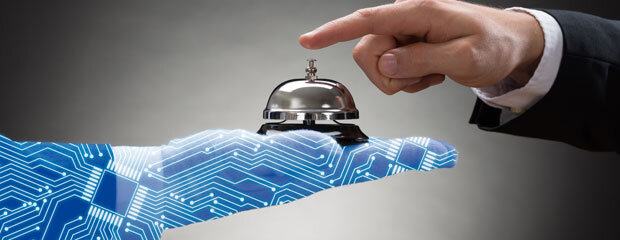COVID-19 has pushed us all into a world of caution. Social distancing regulations and fear of infection have impacted our daily lives as we avoid physical interaction. Even as cases drop and official restrictions ease, a level of cautiousness will likely remain with us for some time. Hotels and other businesses are operating under new guidelines that include sanitization, physical distancing and contact tracing protocols, possibly permanently.
Businesses across all industries are turning to technology to help streamline new processes and maintain customer service. While it seems contrary to the notion of hospitality, right now it is important to reduce physical touchpoints during a hotel stay to help keep guests and staff safe. Modern hotel technology makes this possible through automation that also augments and personalizes the guest experience.
Over the past decade, more and more hotels have been implementing mobile technology to improve workflows and the guest experience. Now, in our touchless new world, such innovation is more crucial than ever.
Self check-in
First impressions count so check-in is an important touchpoint to get right. Guests expect an efficient, personable welcome; a bad one can taint the rest of their stay.
While the check-in process traditionally involves physical interaction between the guest and hotel staff, online technology has spurred consumer demand for self-service applications and many hotel brands have already met that demand with a mobile self-check-in option.
Integrated with the hotel property management system (PMS), mobile self-check-in applications provide guests with an efficient yet personalized check-in process while reducing time at the front desk. In fact, when integrated with online payment and keyless entry solutions, self-check-in apps allow guests to bypass the front desk entirely.
A “touchless” check-in process has never been more relevant than it is now. Self-check-in solutions not only help keep guests and staff safe during the pandemic, but improve efficiency and personalization through data automation too.
Mobile housekeeping app
Although there are less guestrooms to clean at most properties due to low occupancy levels brought about by COVID-19, new housekeeping procedures to mitigate the spread of the virus have made housekeeping responsibilities and schedules more complicated.
Right now, many travelers are wary about physical contact with other people and surfaces. To make guests feel more comfortable, some hotels are offering guests a choice between varying levels of housekeeping service. Some hotels have halted housekeeping service altogether during a guest’s stay to protect the health of both guests and housekeeping staff. Many properties are enforcing a 48-hour or longer room closeout between stays to allow for deeper cleaning and decontamination.
While COVID-19 is still a threat, staying on top of cleaning protocols, schedules and housekeeping requests is of utmost importance. Equipping housekeeping staff with mobile access to the housekeeping report ensures staff are efficient and informed at all times while they work.
Integrated with the PMS, a mobile housekeeping app improves internal communication and workflow by allowing housekeepers to view the live occupancy status of rooms (due in, occupied, do-not-disturb, checked out), and front-desk agents to see which rooms have been cleaned, inspected and are ready for guests in real time. Housekeepers can attach notes and maintenance alarms to rooms as they work, to help keep track of special housekeeping requests, maintenance issues or sick/quarantining guests.
Mobile messaging
Mobile messaging provides a way for hotels to offer guests a convenient, open line of personalized communication, without physical interaction. Rapidly growing in popularity well before COVID-19 hit, mobile messaging solutions for hotels are now truly an answer for the need of the hour.
With an impressive open rate of 98 percent, text messaging is an effective and efficient way to keep guests informed about COVID-19 protocols and hotel services. For example, an automated pre-arrival message could let guests know you are looking forward to their arrival, include a link to a dedicated URL containing relevant hotel information, and invite them to let you know if they have any questions or special requests.
As a COVID-19 precaution, hotel information folders have been removed from many guestrooms because these high-touch surfaces are difficult to clean. In many cases, properties are shifting this information online. An automated text message sent to guests upon check-in can link to online hotel information, ensuring guests are aware of house rules, the Wi-Fi password, etc., and remind guests that they can easily reach out via text messaging if they need anything.
During their stay, guests can use mobile messaging to make requests without having to make physical contact with the front desk, and on the day of departure, self-check-out instructions can be communicated automatically.
Direct integration between the mobile messaging platform and the PMS facilitates the personalization and automation of messages. In this case, reservation data is sent from the PMS to the messaging platform in real time to automate routine message delivery, and to match incoming guest inquiries with reservation data for more efficient and personalized responses and resolution. This can make a significant positive impact on productivity and customer service, not only when occupancy is high, but also when operating with skeleton staff as business begins to recover.
Smart room tech
Light switches, thermostat controls and TV remotes are high-touch points for guests that can be avoided through the use of smart room technology. Powered by IoT (Internet of Things) technology, smart room functionality can be controlled via mobile app or voice-activated digital assistants like Alexa for Hospitality. Guests can close the drapes, turn on the lights, adjust the room temperature, select entertainment programming, order room service and even turn on the coffee machine using their own smartphone or simply by voice command.
Not only does smart room technology offer an elevated level of convenience that modern travelers desire, but reducing physical contact with high-touch surfaces will make guests feel safer while COVID-19 is still out there.
Smart room technology is a significant investment and doesn’t suit all lodging operations, but it makes sense to consider such solutions for our touchless new normal and beyond. In the meantime, make sure guests know that all high-touch guestroom surfaces are disinfected after every stay.
Many aspects of daily hotel operations have changed in the wake of COVID-19. As long as the virus is a threat, operational protocols that enforce physical distancing and thorough sanitization will be our new normal. From self-check-in to mobile messaging, modern technology can help hotels improve efficiency and customer service as they adapt to new processes and prepare to welcome both guests of today and tomorrow.


